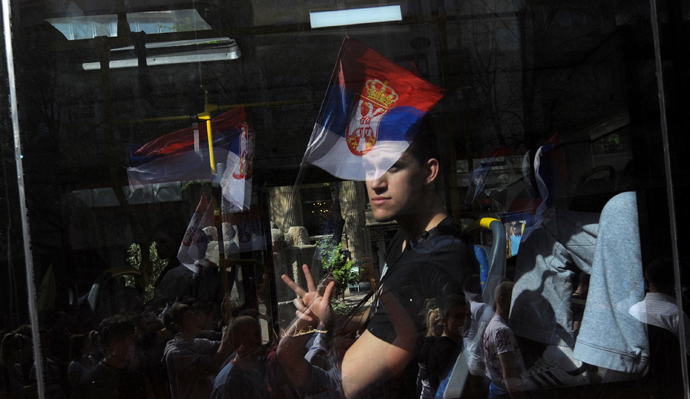
Serbia’s government has approved recognition of Kosovo in exchange for wide autonomy of Kosovo’s Serbs. The possible compromise deal on the breakaway province status triggered nationalist protests in both Belgrade and Pristina.
The EU-mediated negotiations between Serbian Prime Minister Ivica Dacic and his Kosovo counterpart Hashim Thaci seem to have finally borne fruit. On the eve of the EU General Affairs Council’s making decision to start talks with Serbia on its ascension to the EU, official Belgrade put a toe in the water and pronounced the Kosovo deal as fait accompli.
A spokesperson of the Serbian government, Milivoje Mihajlovic, announced on Monday that the government ‘unanimously’ approved the pact stricken with Kosovars; and the ministries have already been ordered to implement the agreement.
According to Mihajlovic official Belgrade agreed to recognize the authority of ethnic-Albanian Pristina over the runaway state in return for wide autonomy of the Serbs minority within Kosovo.
Serbia’s parliament has not even commenced discussion of the agreement; the vote is to take place later this week. Serbia’s deputy Prime Minister Aleksandar Vucic, the leader of Serbian Progressive Party, says a national referendum would possibly be needed to get final approval.

But the news has had an effect on the EU Commission in Luxemburg, which has recommended member states to start negotiations with Serbia on EU membership. However, nationalists in both Belgrade and Pristina reacted angrily.
On Sunday hundreds of Serb nationalists marched the streets of the capital Belgrade chanting ‘treason’ and demanding the current government to resign. Even more protests are scheduled in the run-up to the parliamentary special session on the deal.
In Pristina, where Kosovo's MPs hastily voted in favor of the agreement at an urgent session late Sunday, about 200 ultra-nationalists rallied near the parliament protesting against any kind of autonomy to be granted to Serbs living in Kosovo for centuries. They claimed that the Serb minority in the north of the region cherishes plans to get its land from Pristina’s jurisdiction and reunite with Serbia.
The Kosovo problem finally being resolved has shadowed the fact that Kosovo Serbs have repeatedly warned they will never accept any authority coming from Albanian Pristina.

Kosovo Serbs have proven their decisiveness by constructing barricades to prevent Pristina authorities from entering their enclave since 2011. And even armed interference of the international KFOR forces - a branch of NATO acting as peacekeepers in Kosovo - has not changed that fact.
Ethnic Albanians got the upper hand in the region of Kosovo, where the Serbian nation was born in the Middle Ages, as a result of a NATO assault on Serbia in 1999. In 2008 Pristina declared unilateral independence that Belgrade once pledged never to recognize.
Copyright 2013 mojeNovosti.com
web developer: BTGcms